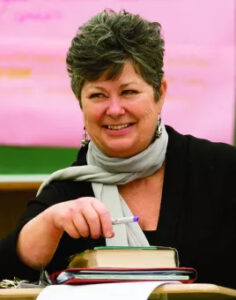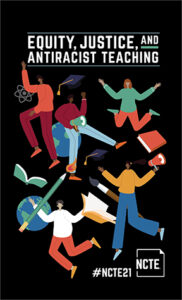This post was written by Linda Christensen, an NCTE member and recipient of the 2020 NCTE Distinguished Service Award.
Teaching is an intellectual profession; yet, too often teachers are not treated as either intellectuals or professionals. We are handed curricula, book lists, and mandates. These days even our department meetings have become scripted spaces. So for almost fifty years, the NCTE Annual Convention has been one of my intellectual homes, a place for me to have conversations about books and teaching and big ideas that I sometimes miss in the day-to-day world of my classroom.
In Toni Morrison’s words, NCTE has been a “friend to my mind,” a center where the courageous members and leaders who comprise NCTE provide visions of what it means to teach for justice in our language arts classrooms while we push back against the racism, sexism, homophobia, and language supremacy that our home institutions are sometimes steeped in.
Over the years, my pilgrimage to the Convention afforded me opportunities to sharpen my practice against the edge of breaking pedagogical currents. In one session many years ago, Sheridan Blau and the South Coast Writing Project crew conducted a workshop using a tea party, where each member of the audience became a different character in the book Cold Sassy Tree. On the airplane ride home, I wrote a tea party for Their Eyes Were Watching God. Later, Bill Bigelow, my social studies teaching partner, developed a tea party/mixer with 20 roles to surface multiple perspectives about the “war with Mexico.” And it didn’t end with us. It spread through the Oregon Writing Project, the NW Teaching for Social Justice network, Rethinking Schools, and our work with unions.
Sometimes Convention talks challenged my core beliefs. In the 1980’s, I attended a session by the linguist Geneva Smitherman and my world was never the same again. In that one talk, Dr. Smitherman, author of Talkin’ and Testifyin’, upended everything I was taught and assumed about language. Her words that November pitched me into a decades-long study of the politics of language, of the ways in which “Standard English” normalized, bullied, and pushed aside other mother tongue literacies. She forever changed my practice.
Mary Kay Healy and James Gray’s workshop about the National Writing Project’s perspectives on professional development (“teachers teaching teachers”) opened up possibilities I didn’t know existed for teachers. From them, I learned about the power of classroom scholars who engage as public intellectuals. Their work gave me a vision of what it might look like to stay in the classroom and use my lessons, my room, as a laboratory for literacy and justice and a platform for engaging others in professional development and writing. And yes, in presenting at NCTE Conventions.
I didn’t have to leave the classroom to become part of the national conversation about my content. Attending the NCTE Convention opened years of engaging conversations with teachers across the country, in workshop sessions, over coffee and tea, and now in Zoom meetings.
This year, with so much controversy swirling over teaching historical truths, I’m excited about the preconference session with Nikole Hannah-Jones, Renée Watson, and Nikkolas Smith about their new collaboration on the 1619 Project: Born on the Water. I look forward to being swept up in poetic inspiration by Amanda Gorman and Alfredo Celedón Luján. And I’m hoping to hear more from April Baker-Bell about her work on linguistic justice.
NCTE encourages teachers to become active citizens in the world of education instead of passive bystanders. We learn how to stand up for the kind of education our students deserve.

Linda Christensen is the director of the Oregon Writing Project (OWP) and was formerly a teacher of high school language arts and a curriculum specialist in Portland, Oregon. She is the author of Reading, Writing, and Rising Up: Teaching about Social Justice and the Power of the Written Word and Teaching for Joy and Justice: Re-Imagining the Language Arts Classroom. Christensen was the recipient of the 2020 NCTE Distinguished Service Award.
It is the policy of NCTE in all publications, including the Literacy & NCTE blog, to provide a forum for the open discussion of ideas concerning the content and the teaching of English and the language arts. Publicity accorded to any particular point of view does not imply endorsement by the Executive Committee, the Board of Directors, the staff, or the membership at large, except in announcements of policy, where such endorsement is clearly specified.
Learn more and register for the
2021 NCTE Annual Convention,
November 18-21!


